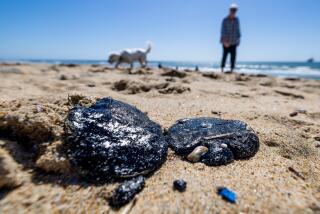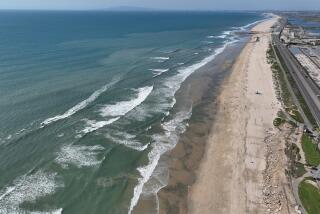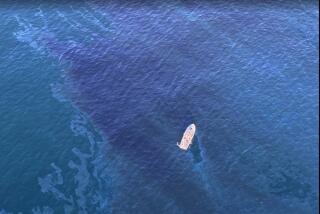‘Midnight Dumper’ Suspected in Oil Spill
- Share via
Garden Grove officials said Tuesday that they suspect someone entered a city yard and dumped the oil that now threatens to kill hundreds of birds 13 miles away in the sensitive Bolsa Chica wetlands.
As cleanup crews began flushing water into the oil-fouled channel linking Garden Grove with the ocean, investigators collected evidence ranging from laboratory results to surveillance videotapes in hopes of finding the “midnight dumper.”
The arduous job of mopping up and fixing blame came as authorities boosted their estimate of spilled oil to 100 to 200 gallons. That could kill or cripple several hundred birds and force cleanup costs “in the healthy six figures,” one state official said.
But Tuesday, the agencies struggling to control the spill had a new partner: the city of Garden Grove, which joined the cleanup after state and federal investigators traced the spill to a collection vault in a city public works yard. The city is using two water trucks to flush the Wintersburg flood control channel under supervision of the U.S. Coast Guard.
Laboratory analysis linked the spilled oil to that found in the city vault, with “pretty much a 99% match,” U.S. Coast Guard Lt. Dan Deptula said.
“I think that we’ve really gotten past where it came from,” Deptula said. “What we haven’t determined is who did it.”
City officials said they were interviewing Garden Grove maintenance workers and other employees, but they suspect an outsider illegally dumped the oil.
“Our belief at this point is that it was someone not associated with the city of Garden Grove,” Deputy City Manager Catherine Standiford said.
Five tapes from surveillance cameras inside the yard are to be reviewed by Garden Grove police detectives and Coast Guard investigators in hopes that the cameras caught the culprit.
“With the time-lapse photography, it covers quite a period of time,” Lt. John Woods said.
The oil was detected Sunday morning in the Wintersburg channel where it feeds into Bolsa Chica, one of the largest and best-known coastal wetlands in the region. Thousands of birds seek out its salt marshes, pools and mud flats, which are now teeming with wintering migrants from Canada and Alaska.
Since Sunday, 40 oil-sullied birds have been taken from Bolsa Chica to the Wetlands and Wildlife Care Center in Huntington Beach to be cleaned and treated. Six birds have died at the center, and others have been found dead in the marshes.
Rescued birds include a night heron, ruddy ducks, pied-billed grebes and coots.
Witnesses reported Tuesday that the oil had tainted some of the larger, more majestic birds associated with Bolsa Chica. Oil-spotted white egrets and great blue herons have been seen in the marshes, along with California brown pelicans, protected under the federal Endangered Species Act. But other rare Bolsa Chica birds, such as the light-footed clapper rail and California least tern, live in another area of the wetlands and appear healthy.
Biologists probed shoreline muds as well, discovering that mussels in one area of Inner Bolsa Bay and along the channel will not close their shells--a signal of pollution.
“If they don’t close up when they’re disturbed, that means they’re sick or dying,” said Lt. Mark Caywood, incident commander for the state Department of Fish and Game. That suggests thousands of other shore dwellers, from worms to barnacles, are also damaged.
In fact, the birds rescued to date represent only a small part of the damage.
“Far more than have been captured could die,” Caywood said. “I rate this as a particularly heavy impact on the environment because of the nature of the pollutant.”
The oil appears to be a lubricant contaminated with solvents such as benzene, toluene and polyaromatic hydrocarbons, he said. The mix has exacerbated environmental damage.
“This is kind of a lesson, in that a little goes a long way,” said Carol Roberts, branch chief for environmental contaminants at the U.S. Fish and Wildlife Service office in Carlsbad.
Officials said Sunday that the spill amounted to about 30 gallons, but estimates have grown each day with the discovery that patches of oil and a thin copper-colored sheen extend 13 miles along the Wintersburg channel.
Coordinating the response are the U.S. Coast Guard and the state Department of Fish and Game, which has taken a three-pronged approach: containing and cleaning the oil, rescuing birds and investigating where the oil came from.
That search led to Garden Grove and the city yard near Westminster Avenue west of Harbor Boulevard.
The state Fish and Game laboratory in Rancho Cordova found the spill matched oil inside a so-called “clarifier” at the city yard. But how oil ended up in a device never intended to contain it remains a mystery.
City workers once used the 1,000-gallon vault to collect runoff and contain asphalt dust and runoff from street-sweeping operations, deputy city manager Standiford said. But a city contractor now performs street-sweeping, and the vault is used only occasionally for gardening waste and cleaned by a contractor once a month, Standiford said.
“It was installed as an environmental protection measure. In some ways, that’s the irony,” she said. “It was never used for waste oil.”
Officials ask that anyone with information about the Bolsa Chica oil spill call the state Fish and Game “Cal-Tip” line at (888) 334-2258. A reward of up to $1,000 is being offered.
Anyone who sees birds stained with oil should not touch them but report them to the Huntington Beach Wetlands Conservancy at (714) 963-2123.
(BEGIN TEXT OF INFOBOX / INFOGRAPHIC)
Effect of Oil on Birds
Birds can suffer respiratory problems, intestinal distress and hypothermia when exposed to even small amounts of oil.
Feathers: No longer repel water. Oil creates gaps in the interlocking net of feather barbs, allowing cold water to creep between feather layers and body. Bird can die from hypothermia.
Skin, eyes: Exposed to toxins.
Internal organs: While preening, birds consume oil, which causes ulcers and damages gastrointestinal tract. Also results in vomiting, diarrhea and injury to liver, kidneys.
Respiratory system: Can be burned by fumes, causing emphysema.
Source: U.S. Department of Fish and Game, Oiled Wildlife Care Network
More to Read
Sign up for Essential California
The most important California stories and recommendations in your inbox every morning.
You may occasionally receive promotional content from the Los Angeles Times.













